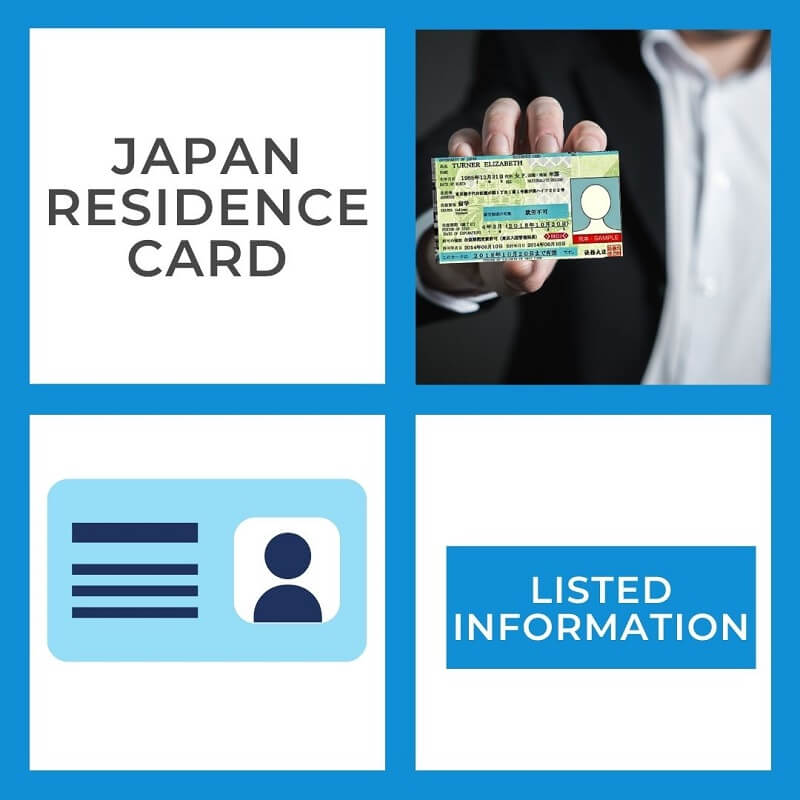Whether you are moving to Japan to work or study for a medium to long-term period, there are things that you need to know, such as getting a Japan residence card. Once you have resident status, you will need to get this card – the proof that you are authorized to reside in the country. And you will then oblige to carry it with you at all times.
In this article, we will help you to learn more about:
- what is a residence card
- the items listed on it
- notification to change the card information
- and why you need to carry it at all times.
What is Japan Residence Card?
The Residence Card or Zairyu Card (在留カード) is an ID card issued by the Ministry of Justice (Hohmusho 法務省) for foreign residents of Japan, who stays in Japan for a medium to long term (3 months or more). It serves as proof that you are a legal resident in the country. In other words, it is an ID card for foreign residents in Japan.
Those foreigners who acquired the resident status by marrying a Japanese or those Nikkeis, those who work in the company, interns, international students, etc. must obtain this important card.
However, if you hold any of the following statuses, then you will not be issued with residence card:
- Temporary Visitor status
- Diplomat or Official status
- Special permanent residents
*Special permanent residents will be issued a Special Permanent Residence Certificate, not a residence card.
The Important Items Listed on Japan Residence Card
The residence card is equipped with an IC chip to prevent falsification. And it has listed all the information below:
1. Basic Information
The basic information such as the following is listed on your residence card.
-
- Name
- Date of birth
- Gender
- Nationality/Region
2. Place of residence or address
If ever you need to change your address in Japan, you must notify the Immigration Bureau or the Municipal Office. Please refer to the next subtopic, notification of Japan residence card for a more detailed explanation.
3. Status of residence
The status of residence is granted by the Japan Immigration Bureau. It is a legal status given to a foreign national who is permitted to stay in Japan, including the scope of activities to carry out.
For example, you will work as a Nurse in Japan, so the status listed in the status of residence column will be Medical Services.
4. Period of stay and date of expiration
The residence has also listed the valid period of your stay in Japan.
- For those permanent residents and highly skilled professionals (ii) who are 16 years old or older, the residence card is valid to 7 years from the date of the issue. While those under 16 years old, the residence card will be valid until the 16th birthday.
- For those non-permanent residents and non-highly skilled professionals (ii) who are 16 years old or older, the residence card is valid until the expiration date of the period of stay. While those under 16 years old, the residence card will be valid until the expiration date of stay or the 16th birthday, whichever comes first.
5. Work restrictions column
If this column is listed as “work is not possible” – this means that you are not authorized to engage in any work-related activities in Japan. However, if the statement is “no work restrictions, you are not restricted to apply for any job content.
6. Non-qualification activity permission column (if any)
If work is not possible as indicated on the card, but you are permitted to work part-time in Japan. The permission is located at the “permit column for activities outside the status of qualification” at the backside of the card.
However, there are some restrictions on working hours and working places that you need to consider, such as:
- You are permitted to work 28 hours a week.
- You can only engage in permitted activities.
7. A photo
A residence shows a face photo of the person authorized to stay in Japan. However, it will not be displayed if the person whose period of stay is before the 16th birthday. In other words, no attached photo for those below 16 years old.
Notifications of Japan Residence Card
Notification or application regarding a residence card
In the event of changing information recorded in your residence card during the period of stay, you need to notify the authorities. The following changes of details can be:
Notification of a place of residence
Foreign nationals (mid to long-term residents) must visit their municipal office to file a notification of a place of residence within 14 days of setting a place of residence.
In the case of changing to a new address, you must visit the municipal office to file. You should file the notification of a place of residence within 14 days upon moving to the new address.
Notification of change of name, date of birth, gender, nationality/region
If you need to change your personal information, you must visit the Regional Immigration Bureau and file within 14 days upon arrival in Japan.
Application to update the period of validity of the resident card
If the residence card is due to expire on his 16th birthday, reapplication is required. It is to update the period of validity of the card.
Application for re-issuance of a residence card
In case of loss, stolen, or damaged residence card, apply for re-issuance as soon as possible.
Why do you need to carry it at all times?
In Japan, bringing of residence card at all times is obligatory. As stated in the Immigration Control and Refugee Recognition Act, failure to carry the residence card will be punished by a fine of up to 200,000 yen.
Apart from carrying it at all times, the Residence Card is also necessary for every situation. It is one of the requirements when applying for the following:
-
- for jobs
- credit cards
- bank accounts
- mobile phone contracts
- and other items necessary for living in Japan
So the first thing you should do upon your arrival in Japan is to secure a residence card. And you can get it at the airport.
-
- Narita Airport
- Haneda Airport
- Chubu Airport
- Kansai Airport
- New Chitose Airport
- Hiroshima Airport
- Fukuoka Airport
But, if in case that you arrive via another port, you will receive it through Simplified Registered Mail to the municipal office of the reported place of residence upon entry.
But what if you decide to leave and plan to return to Japan. Do you have to reapply for a residence card?
Re-entering Japan
Leaving temporarily in Japan doesn’t mean that your residence card will be invalid, and you will need to reapply to get a new one.
However, make sure to present the ED card or Embarkation/Disembarkation Card for Reentrant with a check on the box indicating “Departure with Special Re-entry Permission” to an immigration inspector before leaving Japan. And they will put an approval stamp on your passport afterward.
It is a necessary procedure to consider before you depart at the airport so that the immigration bureau can record your status that you will be back in Japan. Otherwise, you will do all procedures over again to get a new visa even you still have a valid residence card.
So if you plan to leave in Japan, make sure to get an ED card. For more information, please visit the Immigration Services Agency Of Japan here.
If you wish to study in Japan, please do not hesitate to contact us using the form below. Our counseling is free. Contact us now!
Error: Contact form not found.










No comments yet.